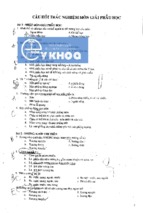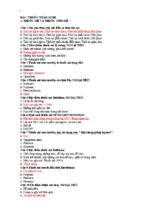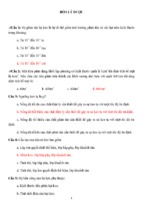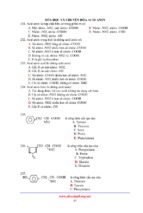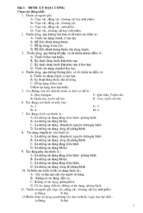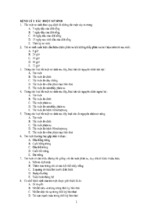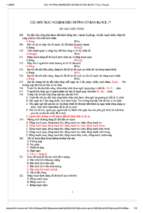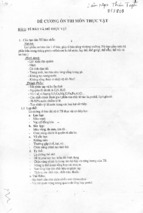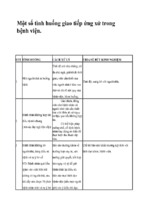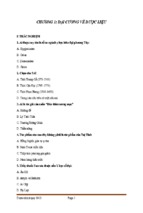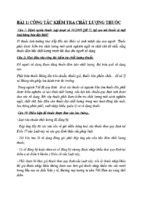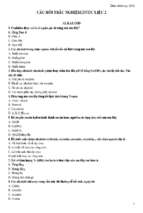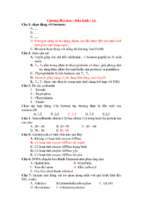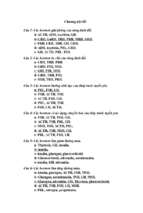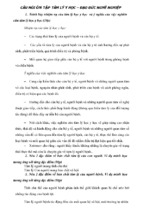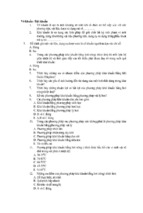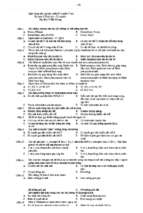Dr John Cheeseman, the Medical Director of St Hilda’s Clinic, is talking to Steven
Brown, a medical student, in his car. They have just arrived outside the home of Mrs
Angela Harvey, one of Dr Cheeseman’s patients.
**********
Dr Cheeseman: Steven, before we go in to see the next patient I’d like to tell you a
bit about her. Angela Harvey is a lady in her late 40s with a primary breast cancer
discovered about four years ago. She initially had a lumpectomy and radiotherapy
followed by tamoxifen. She was fine until three months ago, but then she began
to run into problems. Her GP found an enlarged liver and ultrasound showed that
there’s a large metastasis in it.
Mr Brown: Why are we seeing her today? Does she have any other evidence
of spread?
Dr Cheeseman: She’s had a bone scan because of increasing backache and there
were a couple of hot spots in her dorsal spine which have been treated with
radiotherapy. Her GP has asked me for some advice because, although her back
pain has settled on regular opiates, she’s gone downhill and he can’t really explain
why.
Mr Brown: Isn’t it just the natural course of the disease? I know she’s quite young,
but don’t you sometimes have to let someone die in peace?
Dr Cheeseman: Yes, but even if this is the terminal phase of her illness we ought to
be able to make her feel better. Anyway, let’s go in and see her now.
**********
Inside her home, Dr Cheeseman is talking to Mrs Harvey, his patient.
Dr Cheeseman: How long is it since the radiotherapy?
Mrs Harvey: It finished two weeks ago. I felt much better at first and my back was
much better too. I just feel so tired now, with no energy, and I seem to have got
so clumsy — I’ve spilt two cups of coffee already this morning, and I’ve got no
appetite.
Dr Cheeseman: But your pain is not a problem?
Mrs Harvey: No, no. I take the pain-killers regularly. They said it was important.
Dr Cheeseman: Yes that’s right, it’s very important to take them regularly.
Mrs Harvey: I thought once I’d finished the treatment that I’d start to feel better —
after all my back isn’t hurting any more. If I could just get a bit more energy, then I
could be more active around the house. I think it would help my bowels too. I’m
terribly constipated.
Dr Cheeseman: Well we may be able to change your tablets, so that we can help
you with that. Are you having any problems passing water?
Mrs Harvey: No problems there — quite the reverse. Everything I drink seems to go
right through me.
I even have to get up twice a night which is difficult as I have to wake my husband to
help me.
Dr Cheeseman: Is there anything else bothering you? Anything at all you want to
talk to me about?
Mrs Harvey: No Doctor, it’s just the tiredness really and I’d prefer not to have to get
up so much at night.
**********
Later, Dr Cheeseman and Steven Brown are talking on the way back to the Clinic.
Mr Brown: Why did you take a blood sample?
Dr Cheeseman: Well, based on what she told us, what do you think we should
be checking?
Mr Brown: Mmm, several things. She’s very tired and I guess she could be anemic.
And she complained of nocturia — do you think she might have developed diabetes?
Dr Cheeseman: It’s unlikely. It’s important to consider all of her symptoms —
tiredness, constipation, poor appetite and, finally, what sounds like polyuria.
Obviously these things could have a number of causes, but they may all be related
and due to hypercalcemia. It’s quite common in breast cancer and, if treated, could
certainly make her feel better. If we don’t treat it, she will just go steadily downhill
and eventually go into a coma.
Mr Brown: So, presumably the blood you took was for a serum calcium…
Dr Cheeseman: Yes, and I also want to check her hemoglobin, urea and electrolytes.
Did you notice anything else about her?
Mr Brown: Well, I thought her hands seemed very jumpy. She
seemed fidgety which didn’t fit in with her general state of mind. Is that anything to
do with the calcium?
Dr Cheeseman: Probably not, no. I think you may be confusing hyper- and
hypocalcemia. In hypocalcemia you can get tetany, both spontaneously and when an
inflated blood pressure cuff is applied to the arm. That’s known as Trousseau’s sign.
There’s another sign, Chvostek’s sign, when you see a twitch of the facial muscles
by percussing the parotid gland where the facial nerve comes out.
Mr Brown: So it’s probably got nothing to do with calcium?
Dr Cheeseman: It may just be that she’s a fidgety person, but the movements,
especially of her right hand, seemed too large for that. It looked as if she was
disguising them by converting a myoclonic jerk into a voluntary movement. Do you
know what a myoclonic jerk is?
Mr Brown: I think so. It’s a sudden involuntary movement, isn’t it? I learned about it in
school, but I’ve never actually seen one before.
Dr Cheeseman: Well, it occurs for a variety of reasons.
Mr Brown: Is it due to cerebral secondaries?
Dr Cheeseman: In this case it’s more likely to be due to opioid toxicity. It can be quite
a useful sign and often occurs in the last 48 hours of life when the patient’s renal
function is deteriorating and morphine metabolites build up. Mrs Harvey’s is
probably related to dehydration if she has got hypercalcemia. Her dose of oral
morphine hasn’t been changed since she began radiotherapy despite the fact that
the cause of her back pain may have been removed temporarily.
Mr Brown: How easy is it to reduce the analgesic drugs?
Dr Cheeseman: The best way to lower her opiate dosage is to reduce the regular
dose very gradually while she keeps an oral morphine solution in case the pain
comes back. Most such patients don’t appear to develop addiction and you
can cut the dose, especially if the cause of the pain is removed.
Mr Brown: Is there any way of treating the myoclonus if you can’t reduce the
dosage?
Dr Cheeseman: Well, if we can’t reduce the opiate dose and the myoclonus
is troublesome, we can try a benzodiazepine.
Mr Brown: And what if Mrs Harvey has hypercalcemia? How will you treat it?
Dr Cheeseman: Well, if it’s mild we can treat her at home with rehydration — just
drinking a lot more fluid — and then give her one intravenous injection of a
bisphosphonate, which lowers the calcium for several weeks. Then we can add an
oral bisphosphonate to keep it normal. I hope you’re enjoying your time at St Hilda’s.
Mr Brown: Yes, I am. I thought it would be depressing being surrounded by dying
patients and their relatives but it isn’t. It’s also nice to see patients in their own
homes. We don’t get enough of that in the rest of our undergraduate training.
Dr Cheeseman: That’s right. If there’s one lesson that’s important from today, it’s that
attention to detail is vital when dealing with dying patients. That way we can ensure
the best possible quality of life for their last few months.
- Xem thêm -

